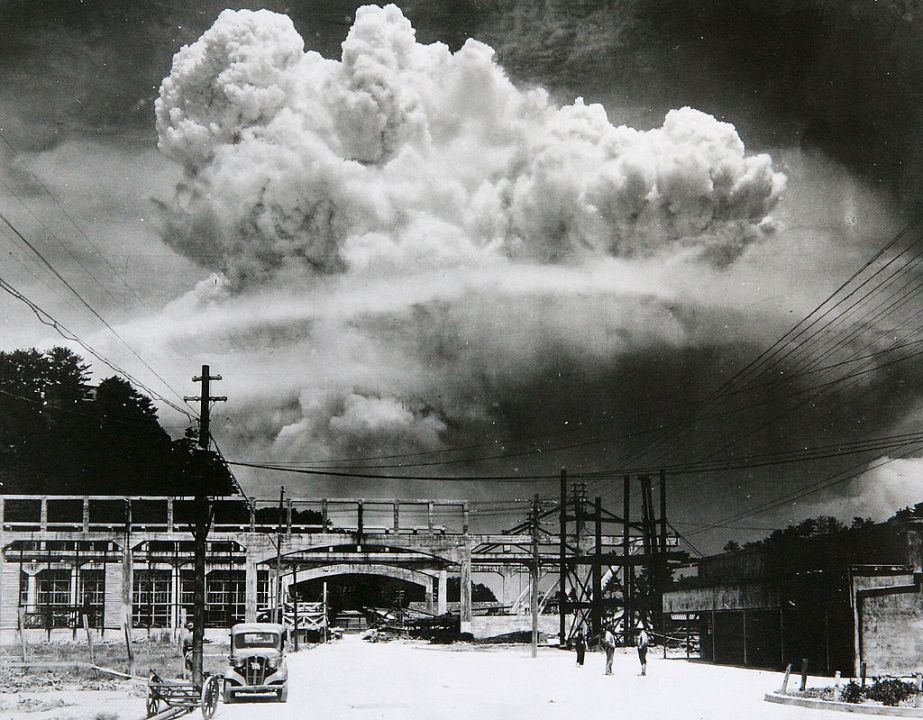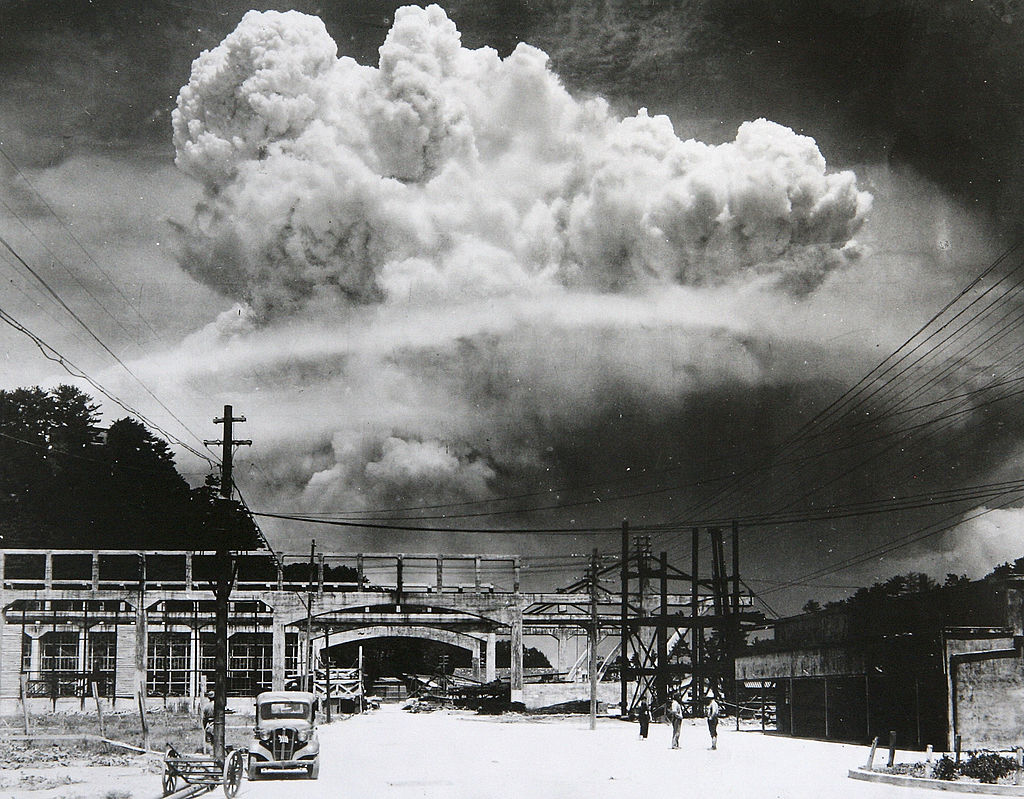The use of nuclear weapons at Hiroshima and Nagasaki is hardly a festive subject. But given that in recent conversations with President Macron, Vladimir Putin has referenced Hiroshima as a precedent that he could use to justify the use of nuclear weapons in Ukraine, it seems a timely moment to evaluate the subject. And this is especially the case when the case for America using the bomb against Japan has more and more come under attack.
The debate about the use of nuclear weapons at Hiroshima and Nagasaki has been increasingly won by America’s revisionist historians. In 1945, 85 per cent of Americans thought that the use of these atom bombs was justified. Sixty years later that level of support had fallen to 57 per cent. In 2020 a YouGov America poll showed that 52 per cent of young Americans thought that the United States should apologise to Japan. In the age of woke it is perhaps not surprising that opinion has turned hostile to American use of the atom bomb and that it is considered immoral and imperialistic.
Psychological aspects of Japan’s wartime death cult have been almost entirely ignored by the revisionist historians
After the war the ‘traditional’ reason for dropping the atom bomb – ending the war and saving American lives – came under heavy attack from liberal and New Left historians of the 60s and 70s such as Gar Alperovitz, Barton Bernstein, Martin Sherwin and Kai Bird. These revisionist historians were joined in their campaign to discredit President Truman’s motives for dropping the atom bomb by anti-capitalist commentators such as Noam Chomsky and Gabriel Kolko.
In recent years British commentators such as the left-talking head, Professor Anthony Grayling, have joined them. Eminent war historian, Professor Richard Overy, editor of the Oxford Illustrated History of World War II, (and formerly my supervisor at Cambridge) has similarly concluded that the dropping of the atom bomb was ‘was immoral, and unnecessary’. At the core of the revisionist argument is that Japan was already defeated.
Indeed, it was defeated, but Japan was still fighting. Japan’s last realistic chance of holding back the Allied powers was lost after crushing naval defeats at the Battle of the Philippine Sea in June 1944 and in October at the Battle of Leyte Gulf, the largest naval battle in history.
Thereafter the United States assumed that it could bomb Japan into submission. The Great Tokyo Air Raid of 6 March 1945 led the way; in one night some 100,000 people died in the great fire storms that swept through the city. People who jumped into the Sumida River to cool themselves boiled to death. Was death by atom bomb ghastlier than this?
In the months after Japan’s naval denouement, the US B-29 Superfortress bombed some 70 Japanese cities, killing 126,000 people. By August 1945 Japan’s largest cities were on average 40 per cent burnt out. Thirteen million Japanese were made homeless. Despite the extraordinary suffering of his people, there was no serious effort to surrender by either Emperor Hirohito, an absolute rather than a constitutional monarch, or his military leaders.
The problem was that Japan was not a normal enemy. Japan’s war machine had turned into a death cult with the emperor as its godhead. After the overthrow of the Shogunate and the restoration of the emperor in 1869, the Meiji Constitution, promulgated in 1889, brought the Emperor as godhead to centre-stage. It defined him as ‘sacred and inviolable,’ ‘head of empire’ (genshu), supreme commander (daigensu) of the armed forces, and superintendent of all powers of sovereignty.
In 1882 the Imperial Rescript to Soldiers and Sailors (Gunjin Chokyuyu) forced recruits to learn by rote a 2,700 Kanji peon to the emperor, which invoked the precept ‘duty is heavier than a mountain; death is lighter than a feather.’ In the years ahead the Imperial Rescript lay at the heart of Japanese military service and invoked in bastardised form the warrior spirit of Bushido with its emphasis on honour in death.
Japan’s military death cult is reflected in the casualty figures. Compared to casualties of 25 per cent for the US army, Japanese Army death rates were over 90 per cent; in the famous island Battles of Tawara and Iwo Jima, the death rates were more than 99 per cent. Against this background of fanaticism, the Potsdam Declaration delivered by the Allies to Japan on 26 July 1945, which stated that if Japan did not surrender, it would face ‘prompt and utter destruction’, was ignored. For Japan’s soldiers and many of its civilians, death was preferable to surrender.
Although kamikaze pilots became the most high-profile symbol of Japan’s death cult, they were not exceptions but the norm in Japan’s conduct of the war. The kill rates in battles with Japan were extraordinary. At the Battle of El Alamein, Germans lost 9,000 men out of 116,000; at the Battle of Imphal, the Japanese army suffered an estimated 70,000 deaths out of the 100,000 who started the battle.
Of course, Japan’s death cult did not just apply to their own soldiers. Prisoners were treated with barbaric cruelty. Mortality rates of British and American POWs were over 25 per cent in Japanese camps compared to just 4 per cent in German camps. Indian soldiers, who comprised the largest prisoner group in Japanese camps, suffered an astonishing 50 per cent mortality rate – perhaps not surprising as they were sometimes used as target practice.
Even in camps in Japan, prisoners, mostly young men, died at an astonishing rate, as I noted when I inspected records held in Nagasaki. Medical experiments done on prisoners at Unit 731 in Harbin, Manchuria, were every bit appalling as those done at Auschwitz.
The revisionists point to Japan’s tentative peace approaches to the Soviets. But the Japanese governments conditions – preservation of the Imperial system, no occupation and no war crimes trials – were clearly unacceptable to the allies. Japan’s offer was a long way from the ‘unconditional surrender’ demanded by President Roosevelt and Churchill at their Casablanca Conference in January 1944.
Ultimately the dropping of an atom was America’s best last hope of bringing the war to an end without the requirement of Operation Downfall, a full-scale invasion of Japan. Waiting for the Allies on the Japanese mainland were 2.5 million troops as well as 28 million armed civilians. Some 12,000 kamikaze pilots and over 1,000 suicide boats were available. Based on a 1:9 success ratio achieved at the Battle of Okinawa, suicide attacks would have sunk at least 250 Allied ships in the event of an invasion.
Caltech and MIT physicist and later Nobel Prize winner Dr William Shockley, who worked as an expert consultant in the office of the Secretary of War, estimated Allied casualties for this operation at 1.7 million to 4 million, with deaths up to 800,000. Estimates of Japanese civilian deaths were as high as 5 million.
Psychological aspects of Japan’s wartime death cult have been almost entirely ignored by the revisionist historians. Japan was a society in which its war minister, General Anami, could, without appearing ridiculous, suggest at a post-atom bomb War Council meeting on 9 August 1945, ‘Would it not be wondrous for the whole nation to be destroyed like a beautiful flower.’ Simarly Admiral Takijiro Onishi, the main architect of Japan’s kamikaze strategy, declared that ‘If we are prepared to sacrifice 20 million Japanese lives in a special attack effort [ie. kamikaze] victory will be ours.’ The fact is that it was only the atom bomb that could have ended the war without a full-scale invasion of Japan.
Death cult apart, all the revisionists ignore the practical realities and duties of political decision-making in an accountable democratic system. In truth the President Truman, given his fiduciary duty to protect the lives of US citizens, combined with what he knew about the human cost of a full-scale invasion of Japan, could not have justified not using the atom bomb. Putin will not have the same excuses if he chooses to use his nuclear option.







Comments